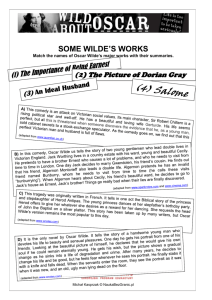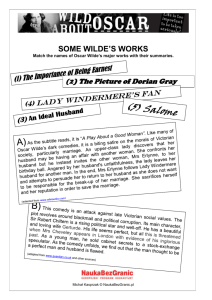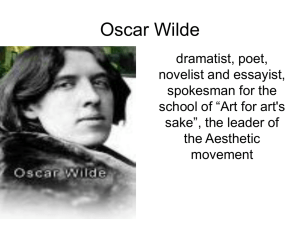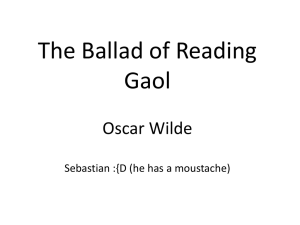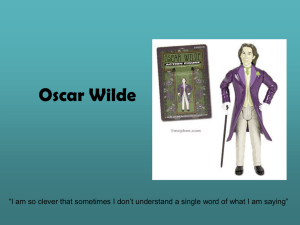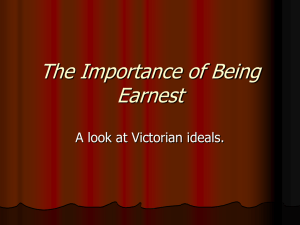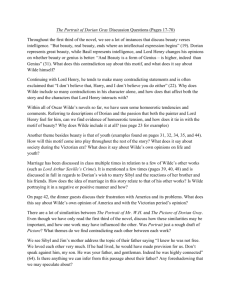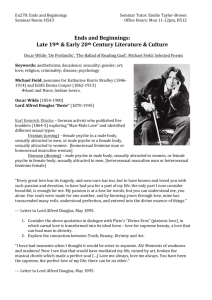Bridget Bergin Mentor: Ellen Crowell Senior Honors Project Abstract
advertisement
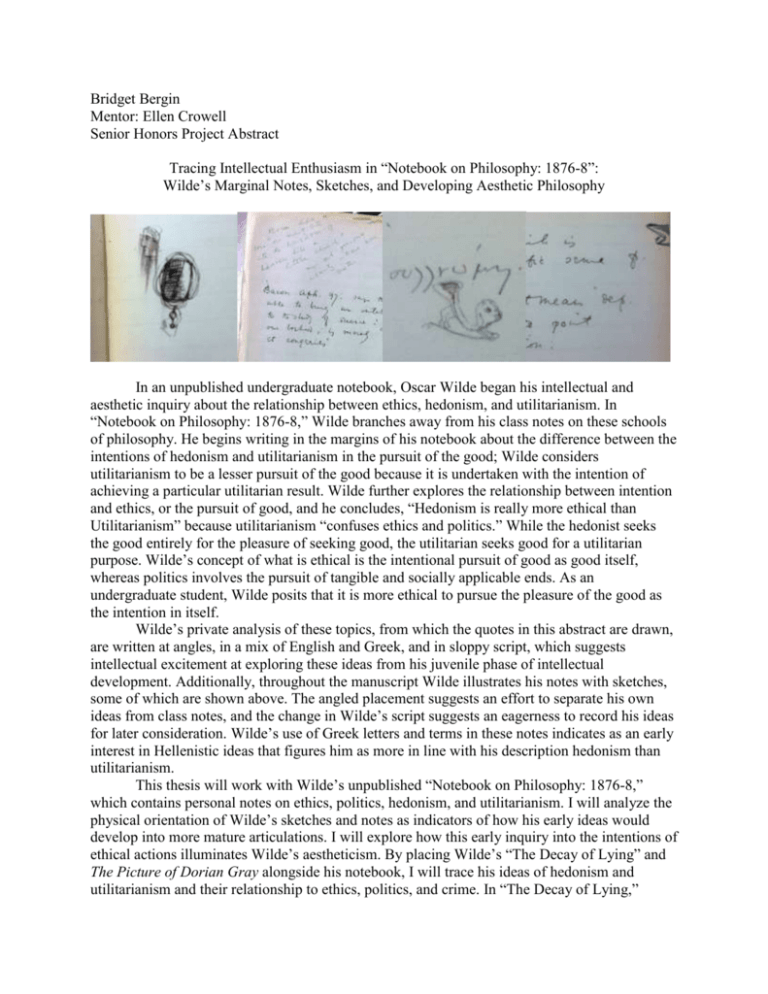
Bridget Bergin Mentor: Ellen Crowell Senior Honors Project Abstract Tracing Intellectual Enthusiasm in “Notebook on Philosophy: 1876-8”: Wilde’s Marginal Notes, Sketches, and Developing Aesthetic Philosophy In an unpublished undergraduate notebook, Oscar Wilde began his intellectual and aesthetic inquiry about the relationship between ethics, hedonism, and utilitarianism. In “Notebook on Philosophy: 1876-8,” Wilde branches away from his class notes on these schools of philosophy. He begins writing in the margins of his notebook about the difference between the intentions of hedonism and utilitarianism in the pursuit of the good; Wilde considers utilitarianism to be a lesser pursuit of the good because it is undertaken with the intention of achieving a particular utilitarian result. Wilde further explores the relationship between intention and ethics, or the pursuit of good, and he concludes, “Hedonism is really more ethical than Utilitarianism” because utilitarianism “confuses ethics and politics.” While the hedonist seeks the good entirely for the pleasure of seeking good, the utilitarian seeks good for a utilitarian purpose. Wilde’s concept of what is ethical is the intentional pursuit of good as good itself, whereas politics involves the pursuit of tangible and socially applicable ends. As an undergraduate student, Wilde posits that it is more ethical to pursue the pleasure of the good as the intention in itself. Wilde’s private analysis of these topics, from which the quotes in this abstract are drawn, are written at angles, in a mix of English and Greek, and in sloppy script, which suggests intellectual excitement at exploring these ideas from his juvenile phase of intellectual development. Additionally, throughout the manuscript Wilde illustrates his notes with sketches, some of which are shown above. The angled placement suggests an effort to separate his own ideas from class notes, and the change in Wilde’s script suggests an eagerness to record his ideas for later consideration. Wilde’s use of Greek letters and terms in these notes indicates as an early interest in Hellenistic ideas that figures him as more in line with his description hedonism than utilitarianism. This thesis will work with Wilde’s unpublished “Notebook on Philosophy: 1876-8,” which contains personal notes on ethics, politics, hedonism, and utilitarianism. I will analyze the physical orientation of Wilde’s sketches and notes as indicators of how his early ideas would develop into more mature articulations. I will explore how this early inquiry into the intentions of ethical actions illuminates Wilde’s aestheticism. By placing Wilde’s “The Decay of Lying” and The Picture of Dorian Gray alongside his notebook, I will trace his ideas of hedonism and utilitarianism and their relationship to ethics, politics, and crime. In “The Decay of Lying,” Wilde asserts that the intention of art is art itself, that all bad art comes from elevating nature to an ideal, that nature imitates art far more than art imitates nature, and that art’s proper aim is lying, or the telling of beautiful untrue things. I will examine these claims through Basil Hallward’s painting of Dorian Gray. I will contextualize Wilde’s ideas through his personal notes, and his exploration of hedonism through Aristippus of Cyrene and utilitarianism through John Stuart Mill. Primary Texts Oscar Wilde The Picture of Dorian Gray Oscar Wilde Intentions John Stuart Mill Utilitarianism Oscar Wilde “Notebook on Philosophy” Secondary Texts O’Keefe, Tim. “The Cyrenaics on Pleasure, Happiness, and Future-Concern.” Phronesis 47.4 (2002): 395-416. Joyce, Simon. “Sexual Politics and the Aesthetics of Crime: Oscar Wilde in the Nineties.” ELH 69.2 (2002): 501-523. Ross, Iain. Oscar Wilde and Ancient Greece. Cambridge: Cambridge University Press, 2012. Lesiak, Carolyn. “Utopia, Use, and the Everyday: Oscar Wilde and a New Economy of Pleasure.” ELH 67.1 (Spring 2000): 179-204. Prewitt Brown, Julia. Cosmopolitan Criticism: Oscar Wilde’s Philosophy of Art. Charlottesville: University Press of Virginia, 1997. Quintus, John Allen. “The Moral Implications of Oscar Wilde’s Aestheticism.” Texas Studies in Literature and Language 22.4 (Winter 1980): 559-574.
